#coronavirus italy
Explore tagged Tumblr posts
Text
We do non-American news too!
Any language that I can at least tell ads from content gets preserved at our covid archive too!
#covid#mask up#pandemic#covid 19#coronavirus#wear a mask#sars cov 2#still coviding#public health#wear a respirator#Italy#italia
6 notes
·
View notes
Text
DJ set Balcony BAILA CONMIGO TUTTO ANDRÀ BENE ❤️🇮🇹
In Palermo people try to cheer up with DJ sessions, despite the fact that the #coronavirus situation is very hard for the general population. All our good energies are with you!! #flashmob #coronavirusitalla #Italy #Italia #coved19 #coved19italia Follow me: https://www.instagram.com/helado_be
#viral#2020#Baila Conmigo#balcon#coronavirus#dj#dj set#flashmob italian opera#forza#good vibes#hope#italia#italian flash mob#italianos#italians#italy#italy news today#italy sing coronavirus#italy singing balconies#italy singing quarantine#march#opera singing balcony italy#optimist#palermo#sicilia#speranza#tutto andrá bene#vida#vita
0 notes
Text
18 mars : les Italiens se souviennent de victimes du covid-19
Le 18 mars 2020, des dizaines de camions militaires chargés de cercueils quittaient Bergame. Ils transportaient les défunts dans d'autres régions, pour les incinérer, car il y avait déjà trop de morts dans la ville. Une photo prise depuis un balcon montrait le triste cortège. Elle a fait le tour du monde et est devenue le symbole de la tragédie vécue par l’Italie au printemps 2020, lors de la pandémie de Covid-19.
Ces défunts n’ont même pas eu de funérailles, comme tous les autres qui sont morts à cette époque. C'est pourquoi la date du 18 mars a été choisie par le Parlement italien pour célébrer la Journée nationale à la mémoire des victimes de l'épidémie de coronavirus (Giornata nazionale in memoria delle vittime dell'epidemia di coronavirus), instituée en 2021. Un anniversaire civil, mais dont se souviennent également les Églises.
En Europe, ce pays a été touché plus précocement que les autres et de manière particulièrement terrible. Le 21 février, des séries de nouveaux cas ont été détectées dans les régions du nord de la Lombardie et de la Vénétie. Les premiers décès ont été enregistrés le lendemain et le gouvernement italien a publié un décret mettant en quarantaine plus de 50 000 personnes de 11 municipalités du nord. Malgré la quarantaine, le virus s'était propagé dans toutes les régions d'Italie début mars. Le 9 mars 2020, le gouvernement a imposé un confinement national. Au plus fort de la pandémie de COVID-19, l'Italie comptait l'un des plus grands nombres de cas actifs au monde et l'année 2020 a enregistré le plus grand nombre de décès dans le pays depuis la Seconde Guerre mondiale.
Ce 18 mars, la plupart des communes, en particulier dans le nord de l’Italie, organisent une cérémonie commémorative pour les cinq ans de la pandémie.
Un article de l'Almanach international des éditions BiblioMonde, 18 mars 2025
1 note
·
View note
Text
@ombrabrontok









Virtual Photo Safari 🇮🇹
https://song.link/s/7kK2m2KDEL0W8oFq6fuOcf

203 notes
·
View notes
Text
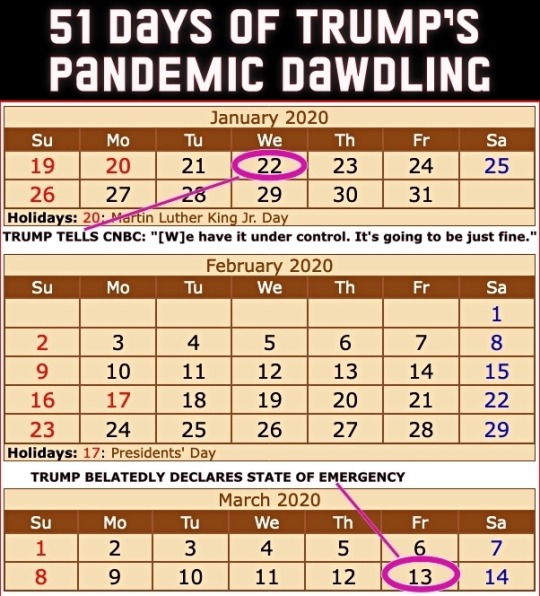
Four years ago today (March 13th), then President Donald Trump got around to declaring a national state of emergency for the COVID-19 pandemic. The administration had been downplaying the danger to the United States for 51 days since the first US infection was confirmed on January 22nd.
From an ABC News article dated 25 February 2020...
CDC warns Americans of 'significant disruption' from coronavirus
Until now, health officials said they'd hoped to prevent community spread in the United States. But following community transmissions in Italy, Iran and South Korea, health officials believe the virus may not be able to be contained at the border and that Americans should prepare for a "significant disruption." This comes in contrast to statements from the Trump administration. Acting Department of Homeland Security Secretary Chad Wolf said Tuesday the threat to the United States from coronavirus "remains low," despite the White House seeking $1.25 billion in emergency funding to combat the virus. Larry Kudlow, director of the National Economic Council, told CNBC’s Kelly Evans on “The Exchange” Tuesday evening, "We have contained the virus very well here in the U.S." [ ... ] House Speaker Nancy Pelosi called the request "long overdue and completely inadequate to the scale of this emergency." She also accused President Trump of leaving "critical positions in charge of managing pandemics at the National Security Council and the Department of Homeland Security vacant." "The president's most recent budget called for slashing funding for the Centers for Disease Control, which is on the front lines of this emergency. And now, he is compounding our vulnerabilities by seeking to ransack funds still needed to keep Ebola in check," Pelosi said in a statement Tuesday morning. "Our state and local governments need serious funding to be ready to respond effectively to any outbreak in the United States. The president should not be raiding money that Congress has appropriated for other life-or-death public health priorities." She added that lawmakers in the House of Representatives "will swiftly advance a strong, strategic funding package that fully addresses the scale and seriousness of this public health crisis." Senate Minority Leader Chuck Schumer also called the Trump administration's request "too little too late." "That President Trump is trying to steal funds dedicated to fight Ebola -- which is still considered an epidemic in the Democratic Republic of the Congo -- is indicative of his towering incompetence and further proof that he and his administration aren't taking the coronavirus crisis as seriously as they need to be," Schumer said in a statement.
A reminder that Trump had been leaving many positions vacant – part of a Republican strategy to undermine the federal government.
Here's a picture from that ABC piece from a nearly empty restaurant in San Francisco's Chinatown. The screen displays a Trump tweet still downplaying COVID-19 with him seeming more concerned about the effect of the Dow Jones on his re-election bid.
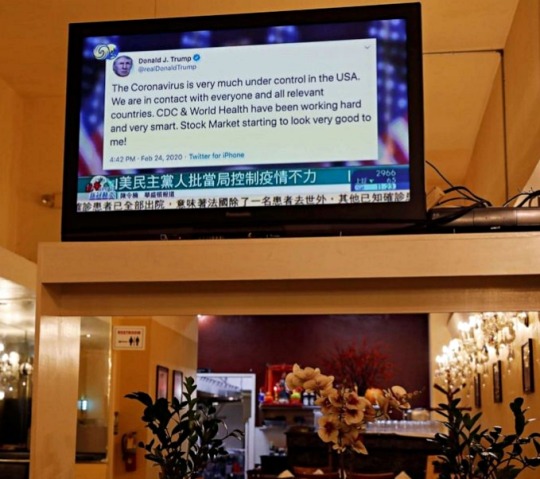
People were not buying Trump's claims but they were buying PPE.
I took this picture at CVS on February 26th that year.
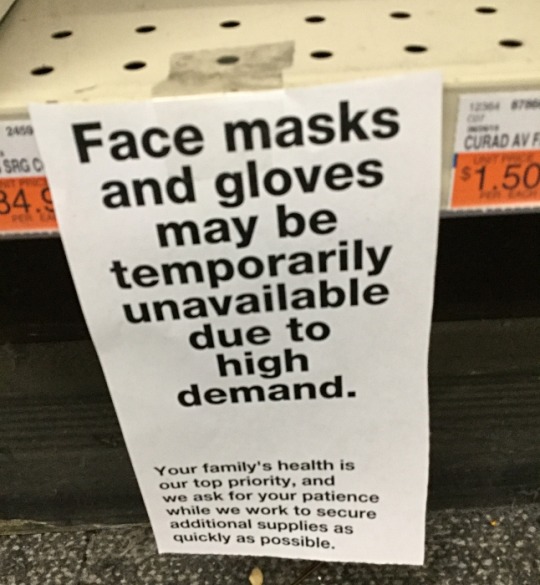
The stock market which Trump in his February tweet claimed looked "very good" was tanking on March 12th – the day before his state of emergency declaration.

Trump succeeded in sending the US economy into recession much faster than George W. Bush did at the end of his term – quite a feat!. (As an aside, every recession in the US since 1981 has been triggered by Republican presidents.)
Of course Trump never stopped trying to downplay the pandemic nor did he ever take responsibility for it. The US ended up with the highest per capita death rate of any technologically advanced country.
Precious time was lost while Trump dawdled. Orange on this map indicates COVID infections while red indicates COVID deaths. At the time Trump declared a state of emergency, the virus had already spread to 49 states.

The United States could have done far better and it certainly had the tools to do so.
The Obama administration had limited the number of US cases of Ebola to under one dozen during that pandemic in the 2010s. Based on their success, they compiled a guide on how the federal government could limit future pandemics.
Obama team left pandemic playbook for Trump administration, officials confirm
Of course Trump ignored it.
Unlike those boxes of nuclear secrets in Trump's bathroom, the Obama pandemic limitation document is not classified. Anybody can read it – even if Trump didn't. This copy comes from the Stanford University Libraries.
TOWARDS EPIDEMIC PREDICTION: FEDERAL EFFORTS AND OPPORTUNITIES IN OUTBREAK MODELING
Feel free to share this post with anybody who still feels nostalgic about the Trump White House years!
#covid-19#coronavirus#pandemic#public health#donald trump#trump's incompetent response to the pandemic#covid state of emergency#2020#trump recession#51 days of trump pandemic dawdling#obama pandemic playbook#2010s ebola outbreak#nostalgia for trump administration#republicans#election 2024#vote blue no matter who
114 notes
·
View notes
Text
“The truth has a slow pace but always arrives at its destination.”
by Fabio Giuseppe Carlo Carisio
VERSIONE IN ITALIANO
Almost 5 years have passed since February 4, 2020 when Gospa News published the first investigation “Coronavirus Bio-Weapon” on the COVID Pandemic virus created in a laboratory. For those investigations, which later became part of the WuhanGates cycle and book of the same name, I was censored by almost all social platforms and ignored by 90% of my journalist colleagues in Italy.
Now, finally, even the CIA (Central Intelligence Agency) confirms what was already supported by two US federal agencies (FBI and Department of Energy) and by the commissions of two branches of the American Congress: SARS-Cov-2 was created artificially.
But this is not the real news. The scoop is that in its final report the richest and most powerful counterintelligence agency in the world has stubbornly ignored dozens of research that have surfaced in our dossier and are now in the public domain in order to continue to blame China for the cover-ups of the origin of the pathogen and to conceal the role of the Pentagon.
25 notes
·
View notes
Text
Evidence is mounting that Europe’s far right will score better than ever before in the upcoming European Parliament elections on June 6 to June 9—and that the continent’s young voters will fuel its ascent. The young adults now gravitating to far right aren’t Nazis or xenophobic racists, but they may have a hand in an outcome that will, at the very least, shift the European Union’s priorities and accents to the right. A particularly solid right-wing finish—and cooperation across the hard-right spectrum—could rattle EU unity and throw a wrench into the bloc’s workings at a time when it is confronting acute crises on several fronts, not least the war in Ukraine.
Since new laws mean that even people under 18 will be eligible to vote in some countries—16-year-olds in Austria, Germany, Malta, and Belgium, and 17-year-olds in Greece—there had been hope that these new voters would put a brake on the populist surge engulfing Europe. The idea behind giving 16- and 17-year-olds the vote was partly based on their long-term investment in politics. The policies designed today will affect them for many decades, in contrast to their grandparents.
And in the 2019 European Parliament election, young voters showed great promise by turning out in record numbers, a hopeful sign that reflected their enthusiasm for the common European project. With the climate movement rocking the streets, their votes went disproportionately to green parties that championed strong climate protection and deeper EU integration—two sets of long-term interests. This landed green representatives from Portugal to Latvia in the Brussels parliament and prompted the EU administration to approve the European Green Deal in 2020.
But the democratic exuberance of voters in their late teens, 20s, and early 30s could boost a very different trend this June, as growing numbers of younger voters are siding with far-right populist parties—the very ones that want to scupper the Green Deal and rein in the EU. In recent national votes conducted in Portugal, Sweden, the Netherlands, Italy, Finland, and France, young people voted in unprecedented numbers for extreme nationalist and euroskeptic parties. (Though some observers have argued that reporting about these trends is incomplete or oversimplified.) And surveys in Germany show the youth vote becoming ever more sympathetic to the Alternative for Germany (AfD), a far-right party that has undergone a radicalization that makes it among Europe’s fiercest, hard-right electoral parties.
“There’s no doubt that these parties have been making inroads to younger voters,” said Catherine de Vries, a Dutch political scientist. “The parties don’t look so extreme anymore, as they’ve been around for a while now. And young people think that the mainstream parties have had their chance. The system still doesn’t work for them, so let the other guys have a try.”
A German study published this year by a team led by youth researcher Simon Schnetzer showed that a full 22 percent of the young people (in this case, ages 14 through 29) surveyed would vote for the AfD if German elections were held today—twice as many as just two years ago. The tally for the Green Party fell by a third during that time frame. A full quarter of those asked said they weren’t sure who’d they vote for—another all-time high result.
The grounds for the pronounced shift are vague: Researchers tend to cite a general unhappiness with the post-pandemic economic and political conditions. “It seems as if the coronavirus pandemic left [young people] irritated about our ability to cope with the future, which is reflected in deep insecurity,” wrote the study’s authors. The issues described by participants that most impact this insecurity included their personal finances, professional opportunities, the health sector, and social recognition. They expressed less concern about the climate crisis and more about inflation, the economy, and old-age poverty.
“We can speak of a clear shift to the right in the young population,” said Klaus Hurrelmann, one of the study’s authors and a professor at the Hertie School in Berlin. The AfD’s foremost campaign priority of stopping immigration and refugee relief plainly struck a chord: Compared to a separate study conducted five years ago, about half as many (26 percent) of the young participants (26 percent) in the 2024 study said they were not in favor of taking in refugees. But just as important as the content of immigration policies, the authors underlined, was the idea that young people feel unheard or involved in the political process.
The change in sympathy in many young Germans reflects survey results, elections, and the statements of other young people across Europe. In the Netherlands’ elections last year, the most popular party among people under 35 (at 17 percent) was the Party for Freedom, led by Geert Wilders, a far-right populist with a long record of EU-trashing.
The explanation provided by many Dutch experts: It’s all about bestaanszekerheid, a Dutch word translated as “livelihood security.” This refers to having a decent and regular income, a comfortable home, access to education and health care, and a buffer against unexpected problems, de Vries told the Guardian. Young peoples’ leading concerns in the Netherlands are housing, overcrowded classes, and struggling hospitals, she said, which Wilders addressed in his campaign.
In Portugal’s March legislative elections, the far-right Chega party, which prioritized courting young people, raked in more of their votes than any other party. The meaning of chega, which can be translated as “that’s enough,” accurately describes many young voters’ motive for supporting it. Their gripes: “a very low average wage and an economy that cannot absorb educated young people,” according to political scientist António Costa Pinto in an interview with Euronews
“In the past, right-wing sympathizers accused immigrants of taking their jobs,” said Eberhard Seidel, the managing director of a Berlin-based nongovernmental organization called Schools Without Racism. “Now there are enough jobs but not enough housing for people who work. They still have to live with their parents.”
Observers say that the far right has excelled at grabbing the youth’s attention, not least with the social media platform TikTok. The recent German study found that 57 percent of young people imbibe their news and politics through social media. More than 90 percent use messaging service WhatsApp, followed by Instagram (80 percent) and YouTube (77 percent). TikTok stands at 51 percent; more than half of all 14- to 29-year-olds now use the app regularly, compared to 44 percent last year. The epiphany prompted an immediate response from German Health Minister Karl Lauterbach, who on declared in his first video on the platform, posted on March 19: “Revolution on TikTok: It starts today.”
Other opinion surveys show that young voters are diverse, divided, and undecided. A YouGov poll conducted in August 2023 showed that young Europeans are overwhelmingly concerned about the climate crisis and its likely effects, and more willing than older people to change behavior to mitigate those effects. Another poll, conducted in Germany, showed human rights violations at the top of younger people’s lists, followed by climate change, sexual harassment, and child abuse.
Younger voters still aren’t the drivers of xenophobia in the way that their parents’ generation was, Seidel said. A vote for the AfD doesn’t necessarily mean that they favor expelling immigrants from Germany or exiting the EU. “They take the basics of democracy and the social system for granted,” he said. “And they’re not fully aware of the implications of a rightward lurch in their political systems.”
Neither were Brexit’s voters, Seidel noted. And they found out the hard way.
87 notes
·
View notes
Text
A New Broadway Musical Asks: Can Robots Fall in Love?
“Maybe Happy Ending” had an initial Korean-language production in Seoul in 2016. Here are five things to know about the show.

Darren Criss and Helen J Shen star as outmoded robots who meet in a retirement home in “Maybe Happy Ending.” (Photo by Lanna Apisukh for The New York Times)
Hue Park was sitting in a Brooklyn coffee shop in the spring of 2014 when “Everyday Robots,” an indie pop ballad by Damon Albarn, floated over the speakers: “We are everyday robots on our phones / In the process of getting home.” What if, Park thought, there were a whole world filled with robots who looked just look humans? The result: a one-act Korean-language musical about a pair of abandoned robots who fall in love in Seoul in 2064. The show, which Park wrote with Will Aronson, a former New York University classmate, found success with its premiere in Seoul in 2016, and five subsequent commercial productions there. The New York Times critic Jesse Green, who saw an English-language production at Atlanta’s Alliance Theater in 2020, called it “charming” and “Broadway-ready.” Now that version will open at Broadway’s Belasco Theater on Nov. 12, starring Darren Criss and Helen J Shen.
The story is about two outcast helperbots who meet at a robot retirement home and build a relationship while grappling with their own obsolescence, and Park thinks it is especially relatable after the coronavirus pandemic. “People have become so comfortable staying alone in their rooms and connecting to each other through a screen,” he said in a recent interview in Midtown Manhattan.
Shortly after previews began last month, Park, 41, a former K-pop lyricist who wrote the show’s lyrics, and Aronson, 43, who wrote the music — both collaborated on the book — talked about their inspirations and the different approaches to developing the show’s Korean and English versions. In a separate video call, Criss, 37, and Shen, 24, discussed the challenges of playing robots who look like humans.
Here are five things to know.

Shen and Criss star alongside two other actors in the musical, which is at the Belasco Theater in Manhattan. (Photo by Jeenah Moon for The New York Times)
The first draft was in English.
Initially, Aronson said, they wrote in English because his Korean — which he began learning in 2008, when he was hired to write the music for a Korean show — “was not as good as it is now.” Park, who was born in South Korea, then wrote the Korean lyrics and translated the script for the musical’s premiere in Seoul. When it came time to create the English version, for the Alliance production, “we went back to the English one we already had,” he said.
Two versions, worlds apart.
Unlike in English-language musicals, the lyrics in Korean-language musicals do not rely on structural rhymes, Aronson said. “A lot of English lyrics are very specific, things you would actually say,” he added. “Korean lyrics are more like poetry.” The English version of “Maybe Happy Ending” also spells out plot details more concretely, according to Park. He noted a scene in the Broadway production in which the former owners of the female robot appear as holograms and recount their relationship history. In the Korean version, which, unlike the Broadway iteration, has a six-piece orchestra onstage, the characters do not appear. Their back story is instead implied in a duet between a male cellist and a female violinist.
The actors have a unique challenge.
The script spells it out: Oliver (Criss) and Claire (Shen) are robots who look like humans (they are dressed like hipsters, circa 2010).
Criss’s robot is an older model, so he, Shen and the production’s director, Michael Arden, decided that he would be the more robotic of the two main characters. That allowed Criss to draw on his training in physical theater at the Accademia dell’Arte, the performing arts school in Arezzo, Italy. “The fear for an actor on a stage is to be like a cartoon character,” said Criss, who cited Kabuki theater, vaudeville and silent-film-era comedians as inspirations for his character’s movements and expressions. “However, because of the construct of our show, which is extremely theatrical and heightened, the more you lean into that, I think the more effective the piece.” As for Shen’s character, the group decided that, because she was a newer model, her movements would be nearly indistinguishable from a human’s. “It was interesting to get to work in that middle ground, that gray area,” she said.
Japan’s hikikomori were an inspiration.
Aronson and Park had read about the hikikomori in Japan, which are extreme recluses — mostly young men — who hole up in a home for six months or more, often sequestering themselves in a single room and rarely engaging with the outside world.
“There’s less and less interaction with other people,” Aronson said. “We’re all becoming more like shut-ins, disconnected.”
It has a majority Asian American cast.
In addition to Criss, who is half Filipino, and Shen, who is Chinese and grew up in New Jersey, the two cast members who appear onstage are Dez Duron and Marcus Choi, who is Korean American. “It’s exciting to have more variety on Broadway,” said Park, who mentioned recent shows like “KPOP” and the puppet-driven play “Life of Pi,” which featured many South Asian actors. “I hope ‘Maybe Happy Ending’ can contribute to that.”
#darren criss#the new york times#hue park#will aronson#helen j shen#michael arden#maybe happy ending bway#maybe happy ending#press#photos#nov 2024
24 notes
·
View notes
Text
Object permanence

I'm on a 20+ city book tour for my new novel PICKS AND SHOVELS. Catch me in NYC on WEDNESDAY (26 Feb) with JOHN HODGMAN and at PENN STATE on THURSDAY (Feb 27). More tour dates here. Mail-order signed copies from LA's Diesel Books.

#20yrsago Italy runs out of wiretaps https://edri.org/our-work/wiretapping-data-access-by-foreign-courts-why-not/
#20yrsago Online anonymity https://web.archive.org/web/20050220170713/http://www.law.com/jsp/ltn/pubArticleLTN.jsp?id=1108389943380
#20yrsago WIPO pulls out dirty tricks to kill participation from consumer groups https://web.archive.org/web/20060909232701/https://research.yale.edu/lawmeme/modules.php?name=News&file=article&sid=1689
#20yrsago UK Labour MP flays govt over terror laws – incredible speech! https://www.theyworkforyou.com/debates/?id=2005-02-23a.365.0#20yrsago Finnish blogger faces disgraceful, bogus libel charge https://mummila.net/marginaali/2005/02/24/total-lack-of-respect-for-the-law/
#15yrsago Vice-principal denies using laptop to spy on student https://www.nbcphiladelphia.com/news/local/principal-accused-in-webcamgate-im-no-spy/2138343/
#15yrsago IP Alliance says that encouraging free/open source makes you an enemy of the USA https://www.theguardian.com/technology/blog/2010/feb/23/opensource-intellectual-property
#10yrsago Chicago Police Department maintains “black site” for illegal detention and torture https://www.theguardian.com/us-news/2015/feb/24/chicago-police-detain-americans-black-site
#10yrsago HSBC boss used tax havens to keep underlings from discovering his outrageous pay https://www.nakedcapitalism.com/2015/02/bill-black-hsbc-ceo-pay-outrageous-use-tax-havens-hide-peers.html
#10yrsago Huge trove of surveillance leaks coming https://www.aljazeera.com/news/2015/2/23/the-spy-cables-a-glimpse-into-the-world-of-espionage
#10yrsago Big Content publishes a love-letter to TPP https://www.eff.org/deeplinks/2015/02/hollywood-lobby-groups-creepy-open-love-letter-tpp
#10yrsago Laura Poitras’s Citizenfour OPSEC https://www.wired.com/2014/10/laura-poitras-crypto-tools-made-snowden-film-possible/
#5yrsago A flat earther commits suicide by conspiracy theory https://pluralistic.net/2020/02/24/pluralist-your-daily-link-dose-24-feb-2020/#epistemological
#5yrsago 81 Fortune 100 companies demand binding arbitration https://pluralistic.net/2020/02/24/pluralist-your-daily-link-dose-24-feb-2020/#iamthelaw
#5yrsago My interview on adversarial interoperability https://pluralistic.net/2020/02/24/pluralist-your-daily-link-dose-24-feb-2020/#dragons
#5yrsago Key computer vision researcher quits https://pluralistic.net/2020/02/24/pluralist-your-daily-link-dose-24-feb-2020/#oppenheimer
#5yrsago How "Authoritarian Blindness" kept Xi from dealing with coronavirus https://pluralistic.net/2020/02/24/pluralist-your-daily-link-dose-24-feb-2020/#thatswhatxisaid
#1yrago Vice surrenders https://pluralistic.net/2024/02/24/anti-posse/#when-you-absolutely-positively-dont-give-a-solitary-single-fuck

14 notes
·
View notes
Text




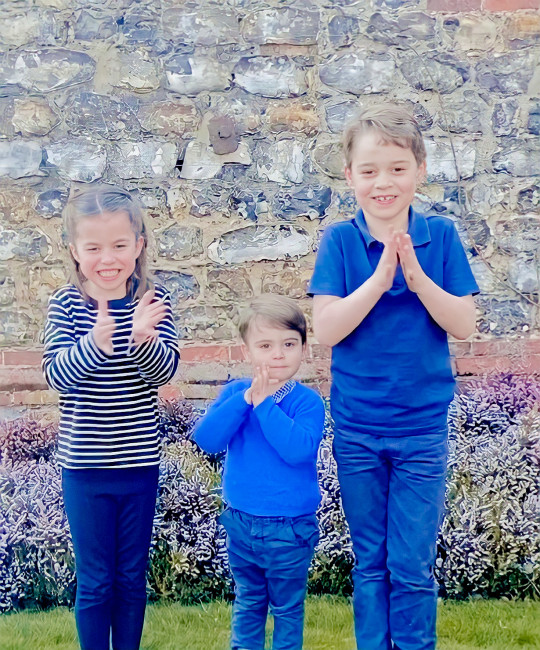


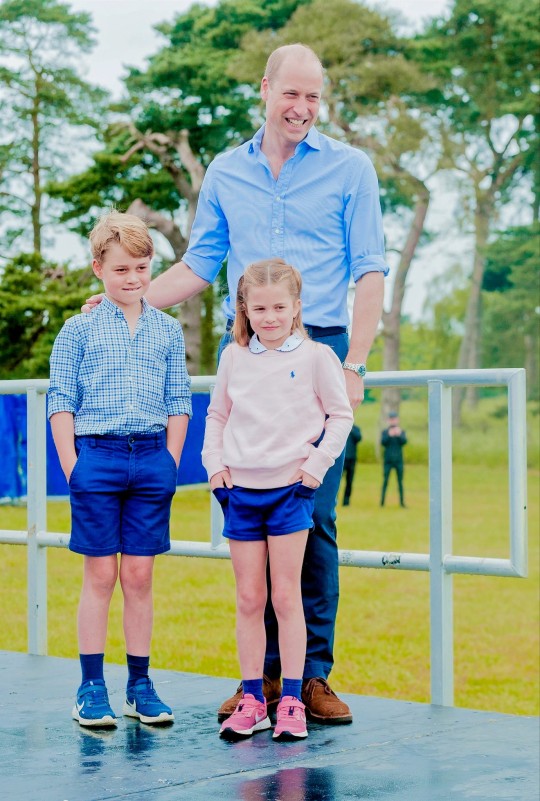


Special post ahead of Prince George of Wales's 10th birthday (3/4) : from 2019 to 2021.
•Prince George's 6th birthday on July 22nd 2019, in St Lucia on The Mustique Island, Carribbean Islands.
•King's Cup Regatta hosted by The Duke and Duchess of Cambridge on August 8th 2019, in Cowes, England.
•First Christmas Day Church service on December 25th 2019, at Church of St Mary Magdalene on the Sandringham Estate in King's Lynn, England.
•Official portrait with Queen Elizabeth II, The Prince of Wales and The Duke of Cambridge to mark the beginning of a new decade, on January 3rd 2020, at Buckingham Palace in London.
•Support to the doctors, nurses, carers, and others NHS staff during the Coronavirus pandemic on March 26th 2020, at Amner Hall in Norfolk, England.
•7th birthday on July 22nd 2020, at Amner Hall in Norfolk, England.
•Message video with Sir David Attenborough on October 3rd 2020.
•Run Sandringham Half Marathon on June 20th 2021, in King's Lynn, England.
•UEFA Euro 2020 Championship final between Italy and England on July 11th 2021, in London.
•8th birthday on July 22nd 2021, in Norfolk, England.
📷 (1, 5, 6, 7 & 10) : The Duke and Duchess of Cambridge/Kensington Palace.
(4) : Ranald Mackechnie/The Royal Family.
#prince george#british royal family#england#2023#july 2023#10th birthday#birthday 2023#prince george's 10th birthday#2019#2020#2021#official portraits#the wales#my edit
95 notes
·
View notes
Text

At-Large Marge. http://Newsday.com/matt :: Matt Davies
* * * *
The lesson of Covid
June 4, 2024
ROBERT B. HUBBELL
The United States suffered more deaths from Covid than any other nation in the world (1.13 million) and the highest death rate (341 per 100,000) of any large, high-income country. Those shocking facts suggest that a congressional inquiry is urgently needed to understand why the US fared so poorly compared to other industrialized nations.
On Monday, the Select Subcommittee on the Coronavirus Pandemic held a hearing ostensibly designed to understand why the US response to Covid paled in comparison to the responses and outcomes by countries like the UK, Spain, Italy, France, Sweden, Australia, Canada, and Netherlands.
You will not be surprised to learn that the hearing did not devote time to understanding what the US could do better in response to the next pandemic. Instead, Republicans converted the hearing into an evidence-free attack on Dr. Fauci’s selfless, expert guidance through a pandemic that killed approximately 1 out of every 300 Americans. See, e.g., Newsweek, Dr. Fauci Testifies: Unvaccinated Americans Caused Additional "200-300k Deaths".
Led by Marjorie Taylor Greene and Jim Jordan, Republicans peddled baseless conspiracy theories that will kill tens or hundreds of thousands of Americans in the next pandemic—just as vaccine hesitancy and disinformation killed hundreds of thousands of Americans in the last epidemic.
Convicted Felon Donald Trump broke the Republican Party when he elevated loyalty to him above belief in the truth. The disgraceful conduct by Republicans in today’s Select Committee hearing is the direct product of Trump's assault on the truth.
A nation cannot govern itself if it creates policy and passes legislation based on fever dreams and mass delusion. Truth matters. Lies matter. That may be the most important lesson of the coronavirus pandemic. It came at a dear cost: The deaths of 1.1 million Americans. We should never forget that lesson or the losses suffered by tens of millions of family members—or we may be condemned to repeat the tragedy in the next pandemic.
[Robert B. Hubbell Newsletter]
#Robert B. Hubbell Newsletter#Robert B. Hubbell#COVID#Dr. Fauci#MAGA conspiracy theories#global pandemic#US House of Representatives#evidence-free attack
10 notes
·
View notes
Text
Covid, +11% casi rispetto alla settimana precedente: preoccupa la variante Xec - 30 Agosto 2024
I'd love some help finding more international news for the archives! Feel free to post whatever you find (and include at least a google translation into English).
Both Italian and English versions below the cut
In crescita i numeri di Covid in Italia. Salgono a 15.221 i casi registrati dal 22 al 28 agosto, +11% circa rispetto ai 13.690 della settimana precedente. In aumento anche i decessi, che superano il centinaio. Sono 135 i morti Covid nell'ultima settimana, il 36% in più rispetto ai 99 della rilevazione precedente.
Questi i dati dell'aggiornamento settimanale su Covid-19 in Italia, pubblicato oggi sul sito del ministero della Salute. Risultano in crescita anche i tamponi eseguiti a livello nazionale, 94.171 rispetto ai 72.266 della settimana 15-21 agosto. Il tasso di positività si attesta al 16,2%, era 18,9% nel bollettino precedente.
Andreoni: “Situazione epidemiologica preoccupante” "Certamente i numeri in crescita del Covid, compresi i decessi che nell'ultima settimana sono arrivati a 135, sono motivo di apprensione perché siamo in un periodo dell'anno in cui la circolazione del virus non è mai stata particolarmente rilevante. In vista dell'autunno occorre un cambio di rotta, la circolazione del virus sarà più importante e la situazione epidemiologica preoccupa perché la campagna vaccinale per il Covid non è ancora decollata". Così Massimo Andreoni, direttore scientifico della Simit, Società italiana malattie infettive e tropicali e professore ordinario all'università Tor Vergata di Roma.
Pregliasco: “Attenzione alla variante Xec” Il Covid purtroppo è ancora fra noi, con un andamento ondulante in funzione anche dell'insorgenza e della presenza delle varianti. Questo rialzo" che si osserva nei numeri del virus in Italia "potrebbe essere l'effetto dell'ultima variante Xec", new entry che è in ascesa a livello globale, "e ha una capacità diffusiva e di immunoevasione che sembra essere alta".
I dati, almeno per quanto riguarda il numero di casi, "sicuramente sono sottostimati". Molti di questi "sono banali, e ci sono magari anche tanti asintomatici che mantengono quella che è la catena di contagi".
È l'analisi del virologo Fabrizio Pregliasco che commenta l'andamento del contagio da Sars-CoV-2 nel Paese.
"È vero - sottolinea il direttore della Scuola di specializzazione in Igiene e medicina preventiva dell'università Statale di Milano - che questa è una patologia nella maggior parte dei casi è banale, che per un giovane può essere approcciata con antinfiammatori. Ma lo vediamo dai numeri in salita dei decessi, è un problema per le persone fragili. Il messaggio è dunque per loro e per gli anziani: in presenza di forme respiratorie, anche dubbie o aspecifiche, facciano comunque un tampone, almeno per loro, per poter fare gli antivirali. Oggi esiste il Paxlovid che evita gli effetti più pesanti per le categorie fragili".
Questi dati in crescita, conclude Pregliasco, "servono anche per ricordare l'importanza del richiamo vaccinale in autunno, sempre e soprattutto per gli anziani e i fragili, sia per quanto riguarda l'anti-Covid che il vaccino antinfluenzale. Oggi insomma è ancora il momento dell'attenzione rispetto a quelle che possono essere situazioni di rischio. E, soprattutto, preserviamo i fragili".
Ciccozzi: “Andamento a cui dobbiamo abituarci” A commentare i dati dei contagi è anche l'epidemiologo Massimo Ciccozzi: "Contagi e decessi per Covid-19 in aumento? Tutto normale, è questo l'andamento a cui dobbiamo abituarci. Alla base dei numeri in crescita i maggior spostamenti di italiani e turisti in transito nel nostro Paese. Chi parte o torna dalle vacanze lo fa viaggiando in aereo o in treno, di conseguenza c'è una maggiore circolazione del virus. Unico presidio contro il contagio è la mascherina che, purtroppo, nessuno indossa più".
"Fortunatamente i sintomi sono meno importanti ma - avverte Ciccozzi - non per anziani e fragili che sono più vulnerabili e fortemente debilitati dal caldo e che vanno protetti". L'epidemiologo non ha dubbi: "Ad ottobre occorrerà fare il richiamo vaccinale per il Covid e l'influenza, soprattutto per over 70 e fragili", conclude.
Covid, +11% cases compared to the previous week: Xec variant is worrying
Covid numbers are growing in Italy. The cases registered from August 22 to 28 rose to 15,221, approximately +11% compared to the 13,690 of the previous week. Deaths are also increasing, exceeding one hundred. There have been 135 Covid deaths in the last week, 36% more than the 99 of the previous survey.
These are the data from the weekly update on Covid-19 in Italy , published today on the website of the Ministry of Health. The number of swabs carried out at a national level is also increasing, 94,171 compared to 72,266 in the week of August 15-21. The positivity rate stands at 16.2%, it was 18.9% in the previous bulletin.
Andreoni: “Worrying epidemiological situation” "Certainly the growing numbers of Covid, including deaths that in the last week have reached 135, are a cause for concern because we are in a period of the year in which the circulation of the virus has never been particularly significant. In view of the autumn, a change of direction is needed, the circulation of the virus will be more significant and the epidemiological situation is worrying because the vaccination campaign for Covid has not yet taken off". Thus Massimo Andreoni , scientific director of Simit, Italian Society of Infectious and Tropical Diseases and full professor at the University of Tor Vergata in Rome.
Pregliasco: “Beware of the Xec variant” Unfortunately, Covid is still among us, with an undulating trend also depending on the onset and presence of variants. This increase" that is observed in the numbers of the virus in Italy "could be the effect of the latest Xec variant", a new entry that is on the rise globally, "and has a diffusion and immunoevasion capacity that appears to be high".
The data, at least as far as the number of cases is concerned, "are certainly underestimated". Many of these "are trivial, and there are perhaps also many asymptomatic people who maintain the chain of contagion".
This is the analysis of virologist Fabrizio Pregliasco who comments on the progress of the Sars-CoV-2 contagion in the country.
"It is true - underlines the director of the School of Specialization in Hygiene and Preventive Medicine of the State University of Milan - that this is a pathology in most cases is trivial, that for a young person can be approached with anti-inflammatories. But we see it from the rising numbers of deaths, it is a problem for fragile people. The message is therefore for them and for the elderly: in the presence of respiratory forms, even dubious or non-specific, do a swab anyway, at least for them, to be able to take antivirals. Today there is Paxlovid which avoids the most severe effects for fragile categories".
These growing data, concludes Pregliasco, "also serve to remind us of the importance of the vaccination booster in the fall, always and above all for the elderly and the frail, both for the anti-Covid and the flu vaccine. Today, in short, is still the time for attention with respect to what may be risk situations. And, above all, let's protect the frail".
Ciccozzi: “A trend we need to get used to” Epidemiologist Massimo Ciccozzi also commented on the infection data: "Infections and deaths from Covid-19 on the rise? Everything is normal, this is the trend we have to get used to. The basis of the growing numbers is the increased movement of Italians and tourists in transit in our country. Those leaving or returning from vacation do so by traveling by plane or train, consequently there is greater circulation of the virus. The only protection against contagion is the mask that, unfortunately, no one wears anymore".
"Fortunately the symptoms are less severe but - warns Ciccozzi - not for the elderly and frail who are more vulnerable and severely weakened by the heat and who must be protected". The epidemiologist has no doubts: "In October it will be necessary to get a booster vaccination for Covid and influenza, especially for over 70s and frail people", he concludes.
#covid#mask up#pandemic#covid 19#wear a mask#coronavirus#sars cov 2#public health#still coviding#wear a respirator#italy
4 notes
·
View notes
Text
I didn't see anyone talk about this, but Sam's storyline in Ted Lasso was heavily based on things that actually happened involving the British government and Marcus Rashford and eventually, since this episode was written before it happened, was a foreshadowing of what would happen with former player and current pundit Gary Lineker (who did make an appearance as himself in S2).
Some may remember this, but during lockdown Rashford raised a lot of money for children in poverty and campaigned for free school meals for poor children whose families couldn't afford proper meals and have free school meals provided due to having to do home schooling according to coronavirus lockdown procedures. This led to a lot of right wing politicians and people telling him to 'stick to football' and like Sam did on twitter on the show, Rashford also got into a heated exchange on twitter with a right wing politician regarding this. Thankfully, because of support for him and ordinary people and small businesses supporting him and choosing to help these families with meals, the government eventually had to give what he campaigned for, which was basically just to save face. Because of this, a murial was painted in honour of Rashford.
Something that was also happening at the time was the Black Lives Matters moment - every single club had their players start to take the knee before the match. And it wasn't just because of this movement, but because of the growing number of racism black players were receiving both social media and in the stadiums. Rashford himself was subjected to a lot of it. A lot of football fans even were booing players taking the knee, especially when English players were playing against opposition from other European countries like Poland and Ukraine, such as in the Euros. But tumblr with the fake workery were more offended by English fans booing national anthems of European countries, than actual ignorance to racism. Many other international teams in the Euros like Italy who tumblr was frothing over because they had some weird fetish for Italian men even refused to take the knee, despite Italian football having far worse racism than England and also being notorious in football for the horrific racism from Italian fans. On club level, it was already bad from football fans, but what happened after the Euros final was something else.
The final went to penalties and Rashford, along with other black players who took the penalties missed them. Almost any of us who are people of colour knew what was gonna happen - which was the horrific racism they all endured not just England, but internationally. Remember the line from Sam about how he is supported till he misses a penalty kick? That was based on this and also Rashford and other black players experiences of racism when missing penalties. I remember as well tumblr and especially Italian fans here and on other social media doing their fake wokery and laughing at these players, all whilst we were trying to ask them not to, when they were getting a lot of racism. But this was probably because Italians subjected Mario Balotelli to the same racism when they lost a final years ago and have been subjecting him to many years, to the point he's been reduced to tears and severely affected his mental health. The next day, it was discovered that the murial painted for Rashford was graffitied with racism. Remember how Sam's restaurant was also graffitied? A lot of people covered them up with messages of support for Rashford, but the man who painted it went back to get it back to normal - what made this more heartbreaking is that he was also black and saw the racism on it which he said made it very hard for him to do. Remember how the players helped fix Sam's restaurant?
As this happened, a right wing politician tweeted that if Rashford 'sticked to football' this wouldn't have happened - she received a barrage of criticism so had to delete the tweet. Also remember how Sam's exchange was with the home secretary of Britain? Well the then home secretary, priti Patel - who is a brown British Indian woman of immigrant background - was criticising the players taking the knee. When the racism happened, she decided to tweet in support which led to a black English player Tyrone Mings furiously (and correctly) responding that her words like her right wing peers has enabled this to happen and that she doesn't get to be a hypocrite and now decide to support them. Because not only did she criticise them, she was also using dangerous rhetoric against refugees - much like the home secretary in Ted lasso.
But just when we thought the worst had happened... Along came suella braverman, another racist brown woman with an immigrant background. She is actually way worse than priti Patel which we never would have imagined and is trying to pass laws that go against international law along with the current right wing government of jailing or deporting people seeking asylum who didn't come from 'legal routes.' Even though they've made it so difficult for them to gain asylum. A Jewish woman actually asked her to stop using the language she has because it reminds her of how Jewish refugees were treated during the holocaust, but she refused to listen and was very offensive. So very similar to the home secretary on Ted lasso talking about sending boats back. Just recently this year Gary Lineker, who himself has housed an immigrant, asked right wing government officials like her to stop using such dangerous language and have empathy which led to him being suspended by the BBC who he does football punditry for, to keep politics out. All of his colleagues then walked out on strike in support of him, along with other people in the country supporting him, which thankfully led to him being reinstated. However sadly, the current right wing government are still using dangerous language against immigrants and refugees and trying to push legislation against them which breaches human rights and international law. Just today, the current prime minister rush sunak - who is also a brown Indian person of immigrant background that has used his immigrant story to help him reach where he is - said legal migration is TOO HIGH - the same things which let him become the British prime minister.
An episode after this one, Ted was reading a story to his son Henry about a character called Marcus - that was a book from Marcus Rashford as he is trying to help improve reading literacy amongst children. Whilst these books were being released he was doing poorly but this season he has been doing AMAZING whilst seemingly taking a step back from the activism he's done. A lot of people, many of whom supported him have said he did badly because he was doing 'too much' off the field when they are ignoring the very obvious psychological effects of continuously being racially abused just before that season, had on him. There have been some changes such as football fans in England since the Euros being overwhelmingly supportive of the taking of the knee and being more supportive of anti racism messages. But support doesn't mean the problems have gone away.
70 notes
·
View notes
Text
March 7, 2020
Over the years I tried my best to schedule an anniversary visit on each March 7. I came into the year 2020 having spent more time at Sleep No More in 2019 than any other year, and was fully intent on visiting even more frequently in the year to come. In December I had turned 40, and after a year of dreading it and feeling miserable about missed opportunities throughout my life, I had realized just how lucky I am and how surrounded by love I am, though none of it looked the way I had expected it would. I had left my job at Pearson on a good severance agreement, and so was not worried about money in the immediate term, or finding a new job right away. We rang the year in in Thailand on a climbing trip, then I spent a few days visiting an ex-boyfriend in Tokyo. All was well with the world it seemed.
And then in late February I was in San Francisco and was reading about the emerging coronavirus outbreaks in China and now in Italy, grateful that I had not gone forward with my original 40th birthday plans of attending Carnival in Venice. On the flight back from San Francisco on March 1, I noticed people masking and wiping down their seats and thought, oh my goodness that's hyperbolic. But soon the virus was popping up in the US, and it seemed like it might make things messy for a few weeks. So I booked a double show on the anniversary, worried that I might not be able to make it back for a while, but still wanting to see some of the new casting. I had no idea what was to come.
There were so many highlights in both shows. At the early performance, Brandon Coleman and Nate Carter teamed up for a stellar combination I dubbed "Pretty Lobby." Joy-Marie Thompson, a new Bald Witch, really stunned me. The late show, unexpectedly, was even better: Paul was Macbeth, and Zach Martens was Malcolm, and I was in the height of old school swooning. Jeff Docimo played an absolutely brilliant Porter that I guessed he must have learned from Will. It was an absolutely wonderful evening, full of brilliant performances, and I was in disbelief that nine whole years had passed since my first night in the Hotel, and I still found it as captivating as ever.
After the late show, I finally got the chance to meet Nate Carter. I apologized for occasionally two-looping him, and he said it was fine, he'd long since figured out that I come to the show "for the gay shit." We talked about many things, including "Your Heart Sings," into the wee hours and being kicked out of Manderely one last time. Everything felt perfect, and I wished this meant I was about to enjoy another year of the show, and once again be a part of the fan community, my bonds to the place healed and restored.
Six days later, Sleep No More, like the rest of Broadway, shut down indefinitely, and it remained closed for 23 months. Many friends found themselves suddenly out of work, and as fans, we did what we could to support them. I remember tuning in for Nate's drag shows on Instagram, or Quarantunes with Steph Amoroso. From the confines of our apartments, we weathered those first few extraordinary months of lockdown somehow. Gradually the world reopened, but Sleep No More itself did not for even longer. Frustratingly the two things I enjoyed most in the world, swimming and Sleep No More, were among the last to return to operation in the post-pandemic world.
I was so glad I had done that final double, and if it had ended up being the sudden and unceremonious end to the show, I would have been glad to end on such a high note, capped by a final night in Manderley feeling like a part of a big, multigenerational family, and glad for the story we had all made together.

Stopping by the shuttered McKittrick Hotel, March 2021
2 notes
·
View notes
Text
"Coronavirus disease 2019 (COVID-19) has been associated with brain functional, structural, and cognitive changes that persist months after infection. Most studies of the neurologic outcomes related to COVID-19 focus on severe infection and aging populations. Here, we investigated the neural activities underlying COVID-19 related outcomes in a case-control study of mildly infected youth enrolled in a longitudinal study in Lombardy, Italy, a global hotspot of COVID-19. All participants (13 cases, 27 controls, mean age 24 years) completed resting-state functional (fMRI), structural MRI, cognitive assessments (CANTAB spatial working memory) at baseline (pre-COVID) and follow-up (post-COVID). Using graph theory eigenvector centrality (EC) and data-driven statistical methods, we examined differences in ECdelta (i.e., the difference in EC values pre- and post-COVID-19) and Volumetricdelta (i.e., the difference in cortical volume of cortical and subcortical areas pre- and post-COVID) between COVID-19 cases and controls. We found that ECdelta significantly between COVID-19 and healthy participants in five brain regions; right intracalcarine cortex, right lingual gyrus, left hippocampus, left amygdala, left frontal orbital cortex. The left hippocampus showed a significant decrease in Volumetricdelta between groups (p = 0.041). The reduced ECdelta in the left amygdala associated with COVID-19 status mediated the association between COVID-19 and disrupted spatial working memory. Our results show persistent structural, functional and cognitive brain changes in key brain areas associated with olfaction and cognition. These results may guide treatment efforts to assess the longevity, reversibility and impact of the observed brain and cognitive changes following COVID-19."
not "just a cold", wear a FFP2 (or N95) mask at all times even if you're not symptomatic
#we could say the sample size isn't big enough but this isn't the first study on this#there's plenty and all show the same things
2 notes
·
View notes
